Go Lean Commentary
There are so many people in different Caribbean countries wanting their national government to double-down in focus, effort and investment in natural resources rather than tourism. They assert that “we” have more than just sun, sand and sea.
These ones claim that our member-states may be among the riches countries of the world due to our abundance of natural resources.
The truth is:
No, we’re not!
The Caribbean member-states are really just small nations in an archipelago.
There is a finite amount of minerals that can ever be extracted from small islands; beyond the 4 Greater Antilles islands (Cuba, Hispaniola and Puerto Rico and Jamaica) and the coastal states (Guyana and Suriname). There is a mature industry for these Raw Materials. The existing Mineral Extraction activities in these country have in turn taught us that this industry may contribute some return to our society, there are a lot of Good, Bad and Ugly lessons for us to learn from the manifestations of this industry. Let’s consider the lessons from one country, Jamaica.
Jamaica is the fifth-largest exporter of bauxite in the world, after Australia, China, Brazil and Guinea. The country also exports limestone, of which it holds large deposits. The government is currently implementing plans to increase its extraction.[241]
Footnote 241 = “Limestone research finds richest deposits in St Elizabeth, Portland and Trelawny”. Jamaica Observer newspaper. Archived from the original on 21 February 2019. Retrieved 21 February 2019.
This island will soon be celebrating the milestone of 70 years of bauxite mining – they started in 1952. They have earned some money, yes, but they have suffered a lot as well.
Today, the Subject Matter Experts are strongly advising the country to: Diversify … away from mining / Mineral Extraction.
This is submission 2-of-6 for the January 2021 Teaching Series from the movement behind the 2013 book Go Lean … Caribbean. Every month we engage in this effort to message to Caribbean stakeholders about issues germane to Caribbean life and culture. We want to help reform and transform the Caribbean economic engines.
This commentary is being written in Nassau, Bahamas – one of the member-states that want to diversify away from tourism and explore / exploit more Mineral Extraction. The Jamaican experience is being presented here as a Cautionary Tale.
Just Say “No” … to Mining …
… or if we do it, do it right.
So while the Go Lean movement wants to consider other types of economic activities to the Caribbean landscape, we urgently want Caribbean people to “measure twice before cutting once” when it comes to Mineral Extraction.
This commentary posits that “all that glitters is not gold” when it comes to mining and/or Mineral Extractions. See the full series here as follows:
- Mineral Extraction 101 – Raw Materials ==> Finished Goods
- Mineral Extraction 101 – Lessons from History: Jamaica’s Bauxite
- Mineral Extraction 101 – Industrial Reboot – Modern factories – Small footprints
- Mineral Extraction 101 – Commerce of the Seas – Encore
- Mineral Extraction 101 – Restoration after Extraction – Cool Sites
- Mineral Extraction 101 – Sovereign Wealth Fund – Not the Panacea
There is the need for cautions in any considerations we make regarding Mineral Extractions. As related in the first entry of this 6-part Teaching Series, our goal is to embrace the commerce of Mineral Extraction for the positives, while avoiding the negatives.
Let’s examine this history more fully. See the News Articles PART 1 and PART 2 in the Appendix below, and also this Abstract of a White Paper here, by the same writer:
Research Paper Title: The Jamaican Bauxite Industry: Glimpses Into Its Past, Present, and Future
By: Carlton E. DavisAbstract
The commercial possibilities of Jamaican bauxite were recognized in 1943 at a time when there was great need for aluminum for the Allied war effort, and when availability was being made difficult by the harassment by German U-boats of Allied bauxite ships plying from the sources of the ore in South America to the North American mainland. For technical reasons, however, it happened that Jamaican bauxite was not required for the war effort.
After the war, because of a number of factors, including the pre-eminence of the geographically-close United States as an economic and military power, and the emergence, at the instigation of the U.S. Government, of three companies (Alcan, Reynolds, and Kaiser), each of which needed its own independent source of bauxite, the Jamaican industry was rapidly developed to the point that the island became the number one world producer in 1957. Growth continued during the economically buoyant 1960s, and at the end of the decade six transnational companies—Alcan, Reynolds, Kaiser, Alcoa, Anaconda, and Revere — were well established, mining and/or processing bauxite in the island.
The industry faced enormous difficulties during most of the 1970s and 1980s as a result, among other things, of the oil price rises in 1973 and 1979, lower economic growth all around, the decline of the United States as a major alumina and aluminum producer and severe competition from new industries in Australia, Guinea, and Brazil where taxes were, by and large, lower.
With the lowering of oil prices since late 1985, a better supply/demand balance in the industry, a weaker U.S. dollar (to which the Jamaican currency is pegged) vis-a-vis other major currencies, and a new taxation regime for the industry with which the companies profess to be happier, the industry is poised to recover some of the ground lost during the troublesome 1970s and 1980s.
Published by: Jamaica Bauxite Institute 1995; retrieved January 23, 2021 from: https://link.springer.com/chapter/10.1007/978-3-642-79476-6_42
We have learned a very bitter lesson from the Jamaican experience: there may be no reversing the environmental damage when it comes to Mineral Extractions. Jamaica is now reeling from the environmental damage. See this related story here:
Jamaican Deforestation and Bauxite Mining – the Role of Negotiations for Sustainable Resource Use
Source: http://www.diva-portal.org/smash/get/diva2:982889/FULLTEXT01.pdf
The Deforestation threat and environmental damage is real! Explore this issue further by reviewing this VIDEO:
VIDEO – Environmental damage from Mining in Jamaica – https://youtu.be/vJa2ftQwfNY
Posted Jun 11, 2008 – Environmentalists are arguing that the bauxite mining industry in Jamaica is having a devastating impact on the environment and surrounding eco-systems. It is also posing serious health problems for local communities. The sun baked sludge contains heavy metals and other pollutants. Al Jazeera’s Anand Naidoo reports from central Jamaica.
Subscribe to our channel http://bit.ly/AJSubscribe
At Al Jazeera English, we focus on people and events that affect people’s lives. We bring topics to light that often go under-reported, listening to all sides of the story and giving a ‘voice to the voiceless.’
Reaching more than 270 million households in over 140 countries across the globe, our viewers trust Al Jazeera English to keep them informed, inspired, and entertained. Our impartial, fact-based reporting wins worldwide praise and respect. It is our unique brand of journalism that the world has come to rely on.
We are reshaping global media and constantly working to strengthen our reputation as one of the world’s most respected news and current affairs channels.
Social Media links:
Facebook: https://www.facebook.com/aljazeera
Instagram: https://instagram.com/aljazeera/?ref=…
Twitter: https://twitter.com/ajenglish
Website: http://www.aljazeera.com/
Google+: https://plus.google.com/+aljazeera/posts
Jamaica had not always employed best practices when it came to Mineral Extractions. After all of the “harm and foul” of this industry, the economic benefits are only a minuscule US$700 Million, just a small fraction of the national economic output. Jamaica now recognizes all of this drama and is trying to reboot, reform and transform their Mineral Extraction ecosystem; see Appendix C below. This Cautionary Tale provides the rest of the Caribbean with Lessons-learned to help us forge our new economic engines.
Wisdom comes from experience. Experience comes from making mistakes.
The Go Lean movement have asserted that Jamaica has a lot of wisdom to share with the rest of the Caribbean; they have made a lot of mistakes over the years. They have suffered, and continue to suffer harsh consequences. Think of their atrocious societal abandonment rate; one source rates their Brain Drain at 85%. So sad!
This commentary has published many previous discussions about Lessons Learned from Jamaica; consider this sample list of previous blog-commentaries here:
| https://goleancaribbean.com/blog/?p=17232 | Way Forward – Jamaica: Must reconcile the Past |
| https://goleancaribbean.com/blog/?p=13040 | Jamaican Diaspora – Not the ‘Panacea’ |
| https://goleancaribbean.com/blog/?p=7866 | Switching Allegiances: Sprinters move on to represent other countries |
| https://goleancaribbean.com/blog/?p=5784 | Egregious Human Rights Abuses in Jamaica – ‘Say It Ain’t So’! |
| https://goleancaribbean.com/blog/?p=4840 | Jamaican Poll: ‘Bring back the British!’ |
| https://goleancaribbean.com/blog/?p=3694 | “Canada” employment programme needed to pump up local economy |
| https://goleancaribbean.com/blog/?p=2830 | Jamaica’s Public Pension Under-funded |
| https://goleancaribbean.com/blog/?p=392 | Jamaica to receive World Bank funds to help in crime fight |
| https://goleancaribbean.com/blog/?p=313 | What’s Holding Back Jamaica’s Reforms |
Learning lessons from Jamaica’s past, means acting in harmony with those lessons. While Jamaica has to reclaim and restore their damaged environment, we can benefit by avoiding the same bad decisioning. We can still have a bright future with a careful embrace of Mineral Extractions.
The Go Lean movement is here to do more in terms of exploring Mineral Extractions in the Caribbean region; we are even here to help Jamaica. The Go Lean book details a series of community ethos, strategies, tactics, implementations and advocacies for the Caribbean Union Trade Federation (CU) to foster development, administration and protections for the Mineral Extraction industry and the neighboring communities. For example, there is the strategies of the Exclusive Economic Zone (EEZ) for the Caribbean Seas and Self-Governing Entities (SGE) on the land. Consider this sample excerpt (headlines and quotations) from Page 195 of the book:
10 Ways to Impact Extractions
| 1 | Lean-in for Caribbean Integration The CU treaty unifies the Caribbean region into one Single Market of 42 million people across 30 member-states, thereby empowering the economic engines in and on behalf of the region, including many public works projects and the emergence of many new industries. The new regional jurisdiction allows for mineral extraction (mines), oil/natural gas exploration in the Exclusive Economic Zone and some federal oversight for domestic mining/drilling/extraction operations, especially where systemic threats or cross-border administration are concerned. One CU mandate is to protect tourism. This is just one of the negative side-effects to be on guard for, see Appendix ZK (Page 334) for other concerns. |
| 2 | Oil – Mitigation Plan The concept of oil exploration is very strategic for the CU, as there are member-states that are oil producers. With energy prices so high, this is a lucrative endeavor. But there is risk, tied to the reward equation; the CU cannot endure a [2010] Deepwater Horizon-style disaster. Risk management and disaster mitigation plan must therefore be embedded into every drilling permit. The CU will oversee this governance and provide transparent oversight, accountability & reporting. |
| 3 | “Rare Earth” Rush – Minerals Priced higher than Gold (Year 2010: $1,000 a pound; $2,200 per kilogram) There is a “rush”/quest to harvest rare earth elements. These include lanthanide elements (15 metallic chemical elements with atomic numbers 57 through 71, from lanthanum through lutetium) for metals that are ferromagnetic, this means their magnetism only appear at low temperatures. Rare earth magnets are made from these compounds and are ideal in many high-tech products. The CU will foster the regional exploration & extraction of these pricey materials. |
| 4 | Pipeline Strategy/Tactical Alignment |
| 5 | Emergency Response / Trauma Center The CU accedence grants authority for federal jurisdiction on oil exploration/drilling projects. This is due to the environmental concerns, systemic threats & strategic implications for energy security. So CU Emergency (Risk, Disaster & Medical Trauma) Managers will audit and test shutdown, mitigation and emergency procedures annually. |
| 6 | Exclusive Economic Zone Oversight / Research and Exploration
The CU has direct jurisdiction in the UN-granted Exclusive Economic Zone (EEZ); mostly, this is the Caribbean Sea area. The CU will carefully expand exploration in the EEZ and regulate cross-border projects, for regional compliance. |
| 7 | State Regulated Mining – Peer Review
The CU may not oversee member-state existing extractions, but there will be a reports-filing requirement; this provides Peer Review and Best Practice monitoring. This advocacy would be most applicable for Jamaica’s Bauxite mines, Guyana’s emerald mines and salt extraction in the Bahamas; [and other efforts in other member-states]. The CU will promote SGE’s for future extraction projects. |
| 8 | Precious Metals – Exclusive to Caribbean Dollar |
| 9 | Treasure Hunting in EEZ – CU must grant Excavation “Permits” |
| 10 | Ferries Schedule for Transport to Offshore Rigs |
So yes, the Go Lean/CU roadmap calls for fostering Mineral Extractions as an industrial alternative to tourism. We have the natural resources on land and in the seas. We may also have the skills and the passionate work-force to employ. We only need the Good Governance in our stewardship.
We have learned a lot from Jamaica’s past … and present; they had not always employed what we know today to be Best Practices. Let’s now consider only the optimizations of this industry – this is the technocratic Way Forward. Our quest now is to only consider Best Practices for the future for all people in all member-states.
The Caribbean people is now ready to consider industrial diversification away from tourism. We need the empowerment that would come from Mineral Extraction; we need it now and we need it bad!
COVID-19 has demonstrated that tourism-only is not good enough – mono-industrial no more!
We must now diversify; this has always been the Best Practice; even mono-industrial Oil Exporting countries see the need to diversify. This is how we can make the Caribbean homeland a better place to live, work and play. 🙂
About the Book
The book Go Lean…Caribbean serves as a roadmap for the introduction and implementation of the technocratic Caribbean Union Trade Federation (CU), for the elevation of Caribbean society – for all member-states. This CU/Go Lean roadmap has these 3 prime directives:
- Optimization of the economic engines in order to grow the regional economy to $800 Billion & create 2.2 million new jobs.
- Establishment of a security apparatus to ensure public safety and protect the resultant economic engines.
- Improve Caribbean governance to support these engines, including a separation-of-powers between the member-states and CU federal agencies.
The Go Lean book provides 370-pages of turn-by-turn instructions on “how” to adopt new community ethos, plus the strategies, tactics, implementations and advocacies to execute so as to reboot, reform and transform the societal engines of Caribbean society.
Download the free e-Book of Go Lean … Caribbean – now!
Who We Are
The movement behind the Go Lean book – a non-partisan, apolitical, religiously-neutral Community Development Foundation chartered for the purpose of empowering and re-booting economic engines – stresses that reforming and transforming the Caribbean societal engines must be a regional pursuit. This was an early motivation for the roadmap, as pronounced in the opening Declaration of Interdependence (Pages 11 – 14):
xi. Whereas all men are entitled to the benefits of good governance in a free society, “new guards” must be enacted to dissuade the emergence of incompetence, corruption, nepotism and cronyism at the peril of the people’s best interest. The Federation must guarantee the executions of a social contract between government and the governed.
xii. Whereas the legacy in recent times in individual states may be that of ineffectual governance with no redress to higher authority, the accidence of this Federation will ensure accountability and escalation of human and civil rights of the people for good governance, justice assurances, due process and the rule of law. As such, any threats of a “failed state” status for any member state must enact emergency measures on behalf of the Federation to protect the human, civil and property rights of the citizens, residents, allies, trading partners, and visitors of the affected member state and the Federation as a whole.
xvi. Whereas security of our homeland is inextricably linked to prosperity of the homeland, the economic and security interest of the region needs to be aligned under the same governance. Since economic crimes … can imperil the functioning of the wheels of commerce for all the citizenry, the accedence of this Federation must equip the security apparatus with the tools and techniques for predictive and proactive interdictions.
xxxiii. Whereas lessons can be learned and applied from the study of the recent history of other societies, the Federation must formalize statutes and organizational dimensions to avoid the pitfalls of communities … . On the other hand, the Federation must also implement the good examples learned from developments/communities … .
Sign the petition to lean-in for this roadmap for the Caribbean Union Trade Federation.
—————-
Appendix A – Title: 60 years of bauxite mining in Jamaica – Part 1
By: Carlton E. Davis, Contributor
ALTHOUGH I have written about the Jamaican bauxite and aluminium industry in three books and numerous articles, I think it is appropriate to repeat some of what I have written to mark the 60th anniversary of the beginning of the commercial mining of the ore.

On June 5, 1952, the first shipment was made by Reynolds Jamaica Mines from its port in Ocho Rios to the parent company’s alumina plant at Hurricane Creek, Arkansas.
The Daily Gleaner ‘jumped the gun’, so to speak, by announcing the impending shipment in the next day or two in its issue of May 28, 1952, with a front page headline: ‘Red Gold Going for the First Time’.
This first shipment was to mark the start of Jamaica’s largest non-service local industry for all but a few of these 60 years.
It was the culmination of a more-than-decade long process of:
(a) Discovery of the existence of large quantities of commercial reserves in the country;
(b) Contemplated use by the allies during the Second World War;
(c) Competition for control over the reserves; and
(d) Research and development activities to enable the economic processing of the ore.
Although the famous geologist, Sir Thomas de la Beche noted the existence of the red marly soil in 1827, and, later, another geologist, C. Barrington Browne, wrote of the red ferruginous (iron-containing) earth, no connection was made between these two observations with the earlier discovery of a naturally-occurring aluminous material, near the village of Les Baux, (hence the naming of the aluminous ore ‘bauxite’) Provence, France, by the French chemist, Pierre Berthier, in 1821.
Two pertinent developments in the late part of the 19th century were to make these naturally occurring aluminous materials (even if in Jamaica’s case they were more recognised for their iron content) important.
The first was the almost simultaneous discovery in 1886 (on the much grander scale, not dissimilar to the separate inventions of the calculus by the 17th century titans, Newton and Leibnitz, of the process of ‘winning’ aluminium from its oxide by electrolytic means. These inventions were by an American, Charles Martin Hall (who had some Jamaican connection, by virtue of his father serving as a congregational minister in the parish of St Mary for 10 years and returning to the United States just before his son was born), and the Frenchman, Paul Louis Heroult.
Two inventions
The second was two inventions, one in 1888 and another in 1894, respectively, of a process for extracting alumina from bauxite by the Austrian Chemist, Karl Josef Bayer. And so the technology was named the ‘Bayer’ process after him.
But it was not until about a-half-a-century after these two discoveries that there was an ‘awakening’ of the commercial possibilities of the Jamaican red, marly soil or ferruginous earth.
This awakening had its genesis in the difficulties experienced by a wealthy gentleman farmer and businessman, Sir Alfred D’Costa, who was having difficulty growing Wynne grass (Melinis minutoflora) for his cattle on his lands in St Ann.
As the saying goes, one thing led to another with the determination by the Government of Jamaica’s Agricultural Chemistry Department, supported by chemical analysis overseas, that the soils, while devoid of essential nutrients for plant growth, had relatively high concentrations of aluminium.
As mentioned above, Sir Alfred was not only a gentleman farmer, but a businessman. So, wearing the latter hat, he sought to interest first the British Empire’s companies, Alcan and British Aluminium in the commercial potential of the ore on his land, and when he found that neither company was interested in sprinting on this matter, he turned to the Dutch Company, Billiton, through whose government he had a connection by virtue of being its Honorary Consul in Jamaica.
In the event, the matter became not merely a case of ‘parson christening his pickney first’, but ‘parson christening only his pickney’ as the ‘Empire Company,’ Alcan, was given a monopoly over of the exploration of the ore. But, as we shall see later, the Second World War and its aftermath, were to usher in the era of Pax Americana and see the United States (US) emerge as the predominant power in world affairs.
Aluminium became an important material of war during the First World War and became much more so during the Second World War, particularly with the increasing role of aircraft as a weapon of war.
So, disrupting the supply chain of this material (as well as others of course) whether in the raw or finished state became of strategic significance to the combatants.
This was precisely what the Germans sought to do in the Atlantic in respect of bauxite shipped from British Guiana (now Guyana) and Dutch Guiana (now Suriname),where bauxite had been mined from the early decades of the last century, to the North American mainland.
Destroyed and harassed Allied shipping
The Germans, through their submarines (called U-boats), destroyed and harassed allied shipping in the Atlantic.
The matter was of such concern, that no less a person than the American military supremo himself, General George Marshall, was moved to write the Commander-in-Chief, United States Fleet, Admiral Ernest J. King, as follows:
…The losses by submarines off our Atlantic seaboard and in the Caribbean now threaten our entire war effort … Of the 74 ships allocated to the army by the War Shipping Administration, 17 have already been sunk. Twenty-two per cent of the bauxite fleet has already been destroyed. …We are all aware of the limited number of escort craft available, but has every conceivable means been brought to bear on the situation?
One such means contemplated was shipping bauxite from Jamaica, which was 1,000 miles closer to the North American mainland than the Guianas and would therefore reduce the risk of U-boat destruction or harassment.
However, this option was not pursued, most likely because of the ‘turning of the tide’ of the war in favour of the allies, and the difficulty of economically processing the Jamaican ore with the then-known ‘American’ Bayer technology.
Two notable developments led to the emergence of two US companies, Reynolds Metals and Kaiser Aluminium, to join Alcan in developing the Jamaican industry.
Carlton Davis is ambassador and special envoy in the Office of the Prime Minister. Please see Part 2 tomorrow.
Source: Posted June 5, 2012; retrieved January 23, 2021 from: http://jamaica-gleaner.com/gleaner/20120605/news/news1.html
—————-
Appendix B – Title: 60 years of Bauxite mining in Jamaica – Part II
By: Cartlon E Davis, Contributor
TWO NOTABLE developments led to the emergence of two US companies, Reynolds Metals and Kaiser Aluminium, to join Alcan in developing the Jamaican industry.
One, was the determination of the US Government and its courts to end Alcoa’s long monopoly of the US aluminium industry. The other, as I indicated earlier, was the emergence of the US as the predominant world military, economic and political power.
All three companies, Alcan, Reynolds and Kaiser, had to develop an appropriate technology to economically refine Jamaican ore into alumina; and this technology proved successful in processing the low monohydrate hematitic ore, which the companies, for the most part mined, for more than three decades.
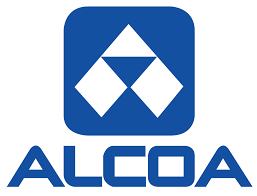
The biggest player in the world aluminium industry, Alcoa, perhaps, because it was now divested of its relationship with Alcan entered the Jamaican industry in 1959. Thus, Jamaica was to have four of the world’s six largest aluminium companies (the two exceptions were the French firm, Pechiney, and the Swiss, Alusuisse) mining or processing ore in the country.
Thriving industry
The activities of the then- existing companies led to Jamaica, in 1957, replacing Suriname as the world’s number one bauxite producer, a position it held until 1971, when it was replaced by Guinea, (which in turn held the position until it was replaced by Australia in 1978).
Apart from bauxite mining or alumina processing, two of the companies by virtue of the large acreages of land [came] under their control; their genuine interest in farming; and their ability to make money, became two of the biggest agricultural operations in the country. Reynolds, mainly in beef cattle (mainly Santa Gertrudis) and Alcan (mixed beef, dairy and crops).
While for the most part, the relationship between the companies, on the one hand, and the Government and the community on the other, were quite cordial, there were tensions at times.
In respect of the Government, there were issues such as: (a) royalty negotiations in 1950; (b) royalty and income tax negotiations in 1957; (c) the bauxite levy negotiations in 1974; and (d) lease arrangements for the JAMALCO plant after Alcoa had closed the plant in 1985.
With the communities there have been issues over land use and environmental impacts.
But overall, the industry has had had a major positive impact on the development of Jamaica, as a whole and not least of all, towns or villages surrounding their operations, such as Mandeville, Manchester; Santa Cruz and Junction St Elizabeth; Brown’s Town, St Ann; May Pen, Clarendon and Ewarton, St Catherine.
All three of the founding companies have since left Jamaica: Reynolds, in 1984; Alcan, in 2001; and Kaiser in 2004. The parent companies did not long survive at any rate as the strong individual companies they once were: Reynolds Metals, did not long exist as an individual company as it was ‘absorbed’ in the Alcoa family in 2000; Alcan was acquired Rio Tinto, an Anglo-Australian Company in 2007; and Kaiser Aluminium is now a greatly-reduced company concentrating on relatively small downstream activities of smelting and fabrication.
Economy blasts companies
These founding companies of the Jamaican industry were eventually succeeded by the Swiss-based trading company, Glencore, which bought Alcan’s operations in Jamaica and held them as an individual entity for a few years before selling them into the now – world number one aluminium company (using certain indicators) UC RUSAL (now 70 per cent owner of alumina capacity in Jamaica): and in terms of the bauxite exporting operation, the new York City-based Apollo Global Management LLC-owned Noranda.
Of the legendary aluminium companies, only Alcoa remains in Jamaica; and one of the purposes of the meeting in New York between that company’s top officials and the prime minister of Jamaica was to try to keep its interest in the country alive.
The ‘Great Recession’; but, in particular the skyrocketing of the price of oil since the beginning of the latter part of the last decade, has shaken the Jamaican industry to the core leaving two plants representing half of the island’s alumina capacity of 4.4 million tonnes per annum idled since early 2009; and the remaining two (including the hitherto, world top-ranking, JAMALCO), barely holding on.
Yet (and perhaps this is a measure of the narrow base of the Jamaican economy) the industry still remains Jamaica’s largest non-service one, by some distance, and the number one gross merchandise earner, for the country, in the amount of over US$700 million per annum.
Our recent meetings in New York with Alcoa, and two other major players in the local industry have encouraged us to believe (to paraphrase Mark Twain) that ‘the news of the industry’s demise may be exaggerated’; and that (to paraphrase an even greater writer, John Milton) ‘All is not lost’.
This results from: (a) more open-mindedness in regard to the choice of fuel to replace oil and the willingness of the Government to work closely with the industry to effect the transformation; (b) a renewed determination by the administration to update the estimates of reserves to enable at least three of the four plants to operate for 30 years at expanded capacities; and, (c) advances (at any rate by a prominent company) to process the difficult high goethite and high phosphorus ores, indicate that the industry may be poised for resurgence.
Will the industry be around for another 60 years? I personally doubt so, having regard to competition for land, ore quality considerations and the reality of ‘environmental activism’.
For me, a half of that period (30 years) will suffice as this will, among other things, give the country more than enough time to diversify its economic base.
Carlton E Davis is ambassador and special envoy in the Office of the Prime Minister.
Source: Posted June 6, 2012; retrieved January 23, 2021 from: http://jamaica-gleaner.com/gleaner/20120606/news/news1.html
—————-
Appendix C – Title: Jamaica’s Bauxite mining is turning around: Approximately 20.82 million tonnes exported 2017-19
The island country Jamaica’s bauxite and alumina industry is retaking its place on the world stage and investors are showing a positive trend to explore Jamaica’s bauxite mines.
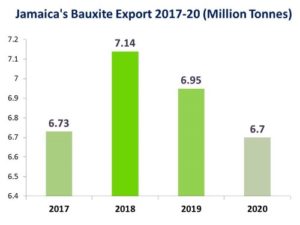
Bauxite mining is considered as the star performer of Jamaica’s economy.
The latest example of Jamaican mining is the progress of JAMALCO, a company focused on bauxite mining and alumina production that is a joint venture between global commodities trader Noble Group, which owns 55%, and Clarendon Alumina Production, which holds the other 45 % and is publicly owned.
Noranda Bauxite shipped an estimated 3.8 million wet metric tons from its bauxite operation at St. Ann, Jamaica last year, and it expects to be able to continue to ship similarly-sized amounts well into the next decade.
The country’s mining is turning around and the export of 20.82 million tonnes bauxite during 2017-19 has been accounted for. The bauxite mining for 2020 is projected at 6.70 million tonnes, when added to the previous year’s figure it reflects 27.52 million tonnes.
In the year 2017, the bauxite importation was recorded at 6.73 million tonnes and in 2018 it was spotted at 7.14 million tonnes. A growth of 6.09% has been measured.
Again in 2019, the bauxite export stood at 6.95 million tonnes, though recorded a slight downfall of 2.67%. The year 2020 has been projected with a positive trend of 6.70 million tonnes, again a growth of 3.5% from the previous year.
Source: Posted February 4, 2020; retrieved January 23, 2021 from: https://www.alcircle.com/news/jamaicas-bauxite-mining-is-turning-around-approximately-20-82-million-tonnes-exported-2017-19-50994

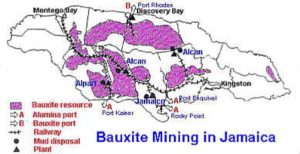

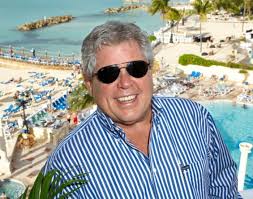 Gordon “Butch” Stewart has died. 🙁
Gordon “Butch” Stewart has died. 🙁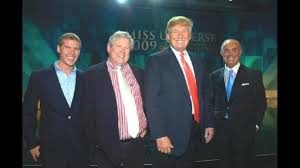 Butch Stewart labored to promote, provide and protect Caribbean interest all over the world. He proved to be a fine role model for the Caribbean youth to emulate. In fact, his profile was featured in the 2013 book Go Lean…Caribbean – on Page 189 – this publication serves as a roadmap for rebooting the Caribbean societal engines of economics, security and governance. See that published profile in the Appendix below.
Butch Stewart labored to promote, provide and protect Caribbean interest all over the world. He proved to be a fine role model for the Caribbean youth to emulate. In fact, his profile was featured in the 2013 book Go Lean…Caribbean – on Page 189 – this publication serves as a roadmap for rebooting the Caribbean societal engines of economics, security and governance. See that published profile in the Appendix below.
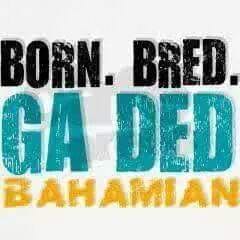


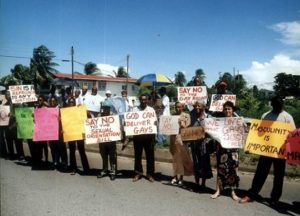

 The Long Train of Abuses is predictable, but not good.
The Long Train of Abuses is predictable, but not good.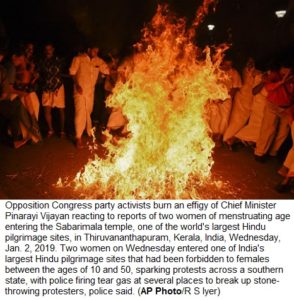
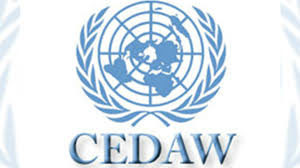
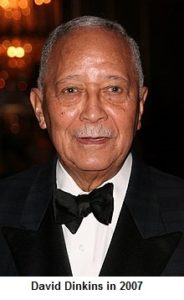 The world is mourning the passing of David N. Dinkins, the former Mayor of New York City – the first and only Black Man to hold that position. We can tell a lot about the measure of the man by taking note of the honors given to him at the time of his death. In this case, it is a …
The world is mourning the passing of David N. Dinkins, the former Mayor of New York City – the first and only Black Man to hold that position. We can tell a lot about the measure of the man by taking note of the honors given to him at the time of his death. In this case, it is a …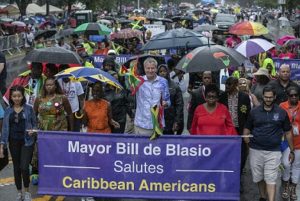
 Nope! This foreign land here, the United States of America is accepted as their New Home. This is their destination. This is where they want to plant themselves and then
Nope! This foreign land here, the United States of America is accepted as their New Home. This is their destination. This is where they want to plant themselves and then 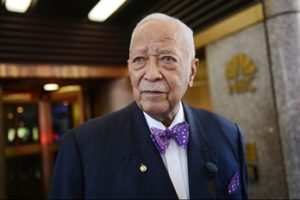 The Public Advocate noted that Dinkins assumed his role in City Hall and in history at a time when the city faced compounding crises of economic turbulence, racial injustice, and systemic failings in housing, policing and healthcare, among other things.
The Public Advocate noted that Dinkins assumed his role in City Hall and in history at a time when the city faced compounding crises of economic turbulence, racial injustice, and systemic failings in housing, policing and healthcare, among other things.
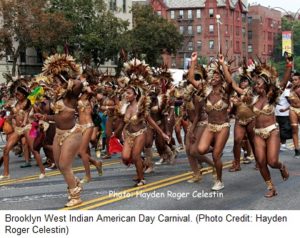
 Dinkins was born in
Dinkins was born in 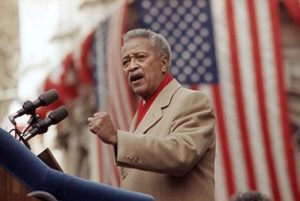 Dinkins entered office in January 1990 pledging racial healing, and famously referred to New York City’s demographic diversity as a “gorgeous mosaic”.
Dinkins entered office in January 1990 pledging racial healing, and famously referred to New York City’s demographic diversity as a “gorgeous mosaic”.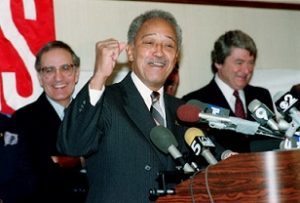 In 1993, Dinkins lost to
In 1993, Dinkins lost to 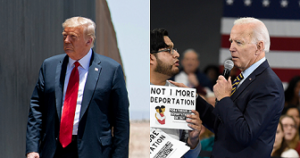 In 2016, many Caribbean people – i.e. Jamaicans – wanted the Democratic Party candidate, Hillary Clinton, to win the Presidency, hoping for a More Liberal Immigration policy.
In 2016, many Caribbean people – i.e. Jamaicans – wanted the Democratic Party candidate, Hillary Clinton, to win the Presidency, hoping for a More Liberal Immigration policy. 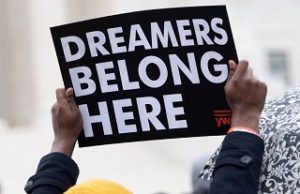 Most of the Jamaican Diaspora in the US –
Most of the Jamaican Diaspora in the US – 
 Unless your ancestors were native to these shores, or forcibly enslaved and brought here as part of our original sin as a nation, most Americans can trace their family history back to a choice – a choice to leave behind everything that was familiar in search of new opportunities and a new life. Joe Biden understands that is an irrefutable source of our strength. Generations of immigrants have come to this country with little more than the clothes on their backs, the hope in their heart, and a desire to claim their own piece of the American Dream. It’s the reason we have constantly been able to renew ourselves, to grow better and stronger as a nation, and to meet new challenges. Immigration is essential to who we are as a nation, our core values, and our aspirations for our future. Under a Biden Administration, we will never turn our backs on who we are or that which makes us uniquely and proudly American. The United States deserves an immigration policy that reflects our highest values as a nation.
Unless your ancestors were native to these shores, or forcibly enslaved and brought here as part of our original sin as a nation, most Americans can trace their family history back to a choice – a choice to leave behind everything that was familiar in search of new opportunities and a new life. Joe Biden understands that is an irrefutable source of our strength. Generations of immigrants have come to this country with little more than the clothes on their backs, the hope in their heart, and a desire to claim their own piece of the American Dream. It’s the reason we have constantly been able to renew ourselves, to grow better and stronger as a nation, and to meet new challenges. Immigration is essential to who we are as a nation, our core values, and our aspirations for our future. Under a Biden Administration, we will never turn our backs on who we are or that which makes us uniquely and proudly American. The United States deserves an immigration policy that reflects our highest values as a nation. … We can get close but never quite catch up. One realizes that this is the same with immigrating to the United States. Despite being a Nation of Immigrants (NOI), new ones can never catch up with the Settlers. Consider the historicity of this distinction in the Appendix article
… We can get close but never quite catch up. One realizes that this is the same with immigrating to the United States. Despite being a Nation of Immigrants (NOI), new ones can never catch up with the Settlers. Consider the historicity of this distinction in the Appendix article 
 There is no problem with femininity, in this context, but “Woe Neely” there are issues with masculinity. The focus of this commentary is Toxic Masculinity.
There is no problem with femininity, in this context, but “Woe Neely” there are issues with masculinity. The focus of this commentary is Toxic Masculinity.
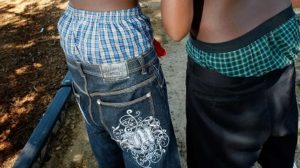
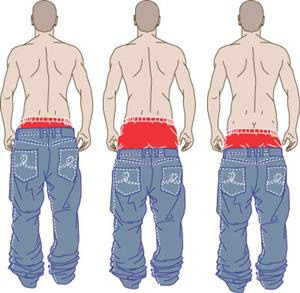
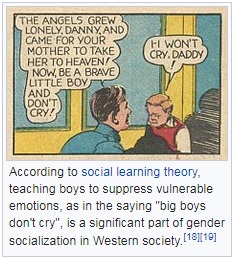 Self-reliance and
Self-reliance and 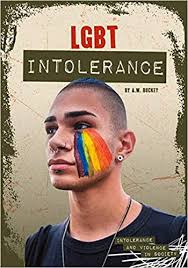
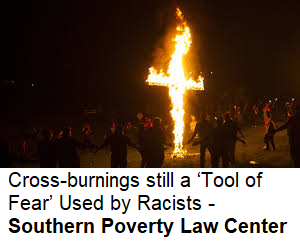

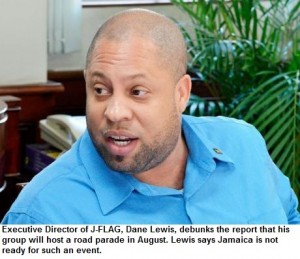



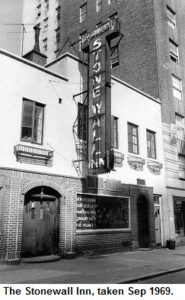 The Stonewall riots (also referred to as the Stonewall uprising or the Stonewall rebellion) were a series of demonstrations by members of the
The Stonewall riots (also referred to as the Stonewall uprising or the Stonewall rebellion) were a series of demonstrations by members of the 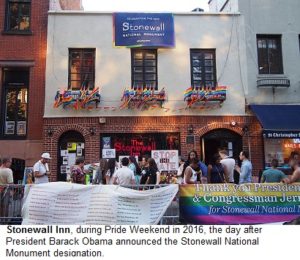
 While we need to look forward, we also need to look backwards. This was the assertion of the 2013 book Go Lean … Caribbean, which advocates for the installation and deployment of a regional power grid heavily dependent on wind energy. The book states (Page 113):
While we need to look forward, we also need to look backwards. This was the assertion of the 2013 book Go Lean … Caribbean, which advocates for the installation and deployment of a regional power grid heavily dependent on wind energy. The book states (Page 113): The energy minister, speaking Friday at Wigton Windfarm’s Initial Public Offering (IPO) investor briefing at the Montego Bay Convention Centre in Rose Hall, St. James, said the production of clean energy from the facility has enabled the country to avoid the purchase of 800,000 barrels of oil, and the emission of one million tons of carbon dioxide, thereby reducing the country’s carbon footprint, the Jamaica Gleaner reported.
The energy minister, speaking Friday at Wigton Windfarm’s Initial Public Offering (IPO) investor briefing at the Montego Bay Convention Centre in Rose Hall, St. James, said the production of clean energy from the facility has enabled the country to avoid the purchase of 800,000 barrels of oil, and the emission of one million tons of carbon dioxide, thereby reducing the country’s carbon footprint, the Jamaica Gleaner reported.
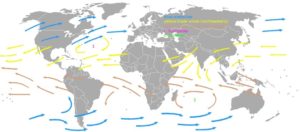
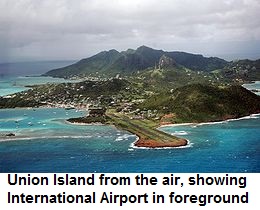

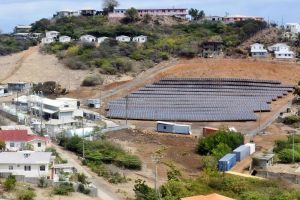
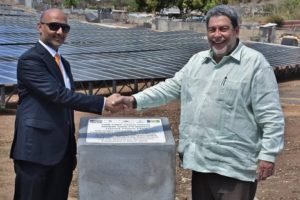 “In the near future, the solar PV farm will generate electricity on the island during the day to supply to the grid. We anticipate that on sunny days, the solar plant will generate excess electricity than is required to supply the average daytime load on the island. The excess electricity will be stored in batteries. The expected annual energy output is approximately 32 per cent of the electricity generated in Union Island in 2018.
“In the near future, the solar PV farm will generate electricity on the island during the day to supply to the grid. We anticipate that on sunny days, the solar plant will generate excess electricity than is required to supply the average daytime load on the island. The excess electricity will be stored in batteries. The expected annual energy output is approximately 32 per cent of the electricity generated in Union Island in 2018. Go Lean Commentary
Go Lean Commentary
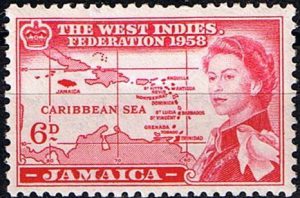 There was a West Indies Dollar, West Indies Regiment (today’s Jamaica Defense Force), University of the West Indies, and the West Indies Cricket Federation just to name a few of the institutions that were formed for this integration purpose – some remain today. But this Federation only lasted 4 years (1958 – 1962). This entity was not destroyed by its enemies, rather it was destroyed internally, by its own people, starting first and foremost with Jamaica. The 2013 book Go Lean … Caribbean – a roadmap for a new integration movement: Caribbean Union Trade Federation (CU) – related this historic summary:
There was a West Indies Dollar, West Indies Regiment (today’s Jamaica Defense Force), University of the West Indies, and the West Indies Cricket Federation just to name a few of the institutions that were formed for this integration purpose – some remain today. But this Federation only lasted 4 years (1958 – 1962). This entity was not destroyed by its enemies, rather it was destroyed internally, by its own people, starting first and foremost with Jamaica. The 2013 book Go Lean … Caribbean – a roadmap for a new integration movement: Caribbean Union Trade Federation (CU) – related this historic summary:
 Jamaica needs to reach back into their past, learn what it was that they did wrong – their fathers did wrong (see Appendix VIDEO below) – accept the learned-lessons, turn a new leaf and then march forward into the future with a determination and devotion to think, feel and act differently and better. This sounds so much like the Serenity Prayer that Alcoholics and Addicts are urged to enchant everyday:
Jamaica needs to reach back into their past, learn what it was that they did wrong – their fathers did wrong (see Appendix VIDEO below) – accept the learned-lessons, turn a new leaf and then march forward into the future with a determination and devotion to think, feel and act differently and better. This sounds so much like the Serenity Prayer that Alcoholics and Addicts are urged to enchant everyday: This entire series asserts that “no man is an island” and that in fact “no island is an island”. Jamaica have always needed to collaborate and confederate with its regional neighbors. Their failure to do so, only imperiled their economic, security and governmental engines. Then their people fled; they left and joined communities abroad where the needed integration, cooperation and harmony existed.
This entire series asserts that “no man is an island” and that in fact “no island is an island”. Jamaica have always needed to collaborate and confederate with its regional neighbors. Their failure to do so, only imperiled their economic, security and governmental engines. Then their people fled; they left and joined communities abroad where the needed integration, cooperation and harmony existed.